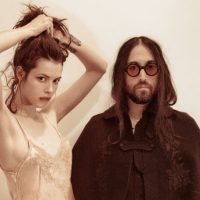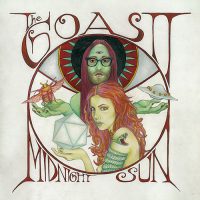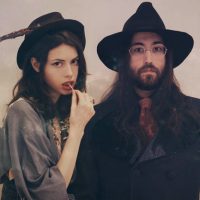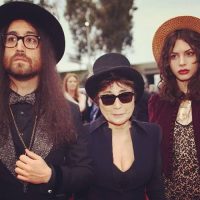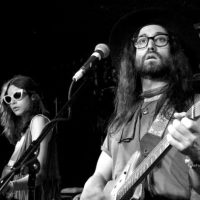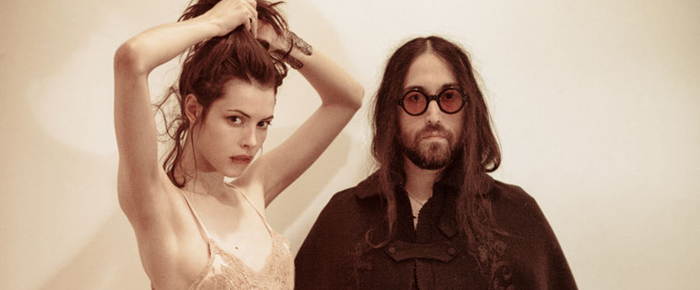
By Eleni P. Austin
Perhaps no one is more familiar with the down side of fame and celebrity than Sean Lennon. His father, John Lennon, leader of the Beatles, was quite possibly the most influential musician in the world.
In December, 1980, John Lennon was gunned down in the street. Sean was only five years old. No one could blame him for avoiding the limelight. But he couldn’t deny biology, he was born to be a musician.
Sean began his musical journey tentatively. Maybe he viewed his older half-brother Julian’s career as a cautionary tale. Julian’s 1984 debut, Valotte and the follow-up, The Secret Value Of Daydreaming achieved instant success, but subsequent albums were met with apathy.
During his childhood, Sean began playing on his mother, Yoko Ono’s records. At age 16 he collaborated with Lenny Kravitz on “All I Ever Wanted,” a song featured on Kravitz’s Mama Said album. By 1995, he formed the band IMA, backing his mother on her Rising album and tour.
In 1997, Lennon began performing with the duo Cibo Matto. He joined the band as touring bassist and played on their second album, Stereo Type A. He also became romantically involved with keyboardist, Yuka Honda.
Dipping his toes a little further in the pop culture waters, he signed with the Beastie Boys’ Grand Royal record label in 1998. With Yuka Honda handling production, he recorded his solo debut Into The Sun.
It was a pleasant effort, in the same wheelhouse as Beck and Australian singer-songwriter Ben Lee, accented by lovely hints of Bossa Nova. Invariably, any attention paid to the record focused on his famous heritage.
In the ensuing years he took a step back from the spotlight, continuing to play with Cibo Matto, and contributing to albums by Del tha Funkee Homosapien, Handsome Boy Modeling School and Jurassic 5.
Eight years passed before he recorded his sophomore effort, Friendly Fire. (Grand Royal had closed up shop, so he signed with his father’s label, Capitol.) Sean’s creative impetus was wrapped in bitterness and regret. His former girlfriend had cheated on him with his best pal from childhood. Tragically, Max LeRoy was killed in a motorcycle crash before the two had reconciled.
Despite the dour circumstances, the album was airy and light, recalling the Baroque pop of the Left Banke and Todd Rundgren. It wasn’t a runaway success, but sales were respectable.
Sean retreated again, producing his mother’s 2009 album, Between My Hand And The Sky. After meeting new girlfriend, Charlotte Kemp Muhl, the pair started their own record label, Chimera Music.
Although the couple met at Coachella, somehow Charlotte, (a model since age 13), was not very familiar with Sean’s illustrious family history. He was shocked to discover she had never heard “Strawberry Fields Forever!”
They began making music together as Ghost Of A Saber Tooth Tiger (or GOASTT). The name is derived from a play Charlotte had written at age seven. Their debut arrived in late 2010. Gentle and slightly wispy, it was likeable but not essential.
Now GOASTT has returned with their second effort, Midnight Sun. Eschewing the sweet quietude that characterized Acoustic Sessions the album leaps down the rabbit hole with the opening track, “Too Deep.”
Fractious drums collide with distorto, wocka-wocka-wocka guitars, tinkling piano and washes of Hammond B-3. It feels like a completely different band.
The next two tracks, “Xanadu” and “Animals” offer up a crash course in ‘60s Psychedelia. On “Xanadu” rubbery percussion is matched with eerie Chamberlain runs. The lyrics offer a sketch of a part-time radical…”She’s a lipstick anarchist.”
“Animals” slips and slithers. The lyrics display the trademark Lennon sarcastic wit… “Do you believe what you read in the tea leaves, messages from Jesus in the grease upon the grilled cheese/Do you agree with the man on the TV, evidence that aliens brought Elvis to the Pleiades.”
Of course Sean’s vocal inflections have that Fab Four lilt, but his voice is kind of thin and reedy. Harmonizing with Charlotte manages to camouflage his deficiencies. But Charlotte takes the lead on two songs, “Johannesburg” and “The Devil You Know.”
The former feels summery and ethereal. Charlotte’s voice is feather-light, as she unspools a litany of nonsequiturs…“Elephants can cry salty tears, while I haven’t wept for seven years/My crowsfeet walk across the mirror, it’s only tomorrow who gets old here.” The instrumental break is a breezy and lush blending angular sitar-like guitar riffs and fluttery horns.
Conversely, the melody and instrumentation on the latter is a swirling maelstrom, propelled by rippling percussion and cyclonic guitar riffs. Charlotte plays all the instruments, save vibraphone.
Of course it’s impossible to ignore the Beatlesque elements here. It’s all very “Goo-Goo-G’Joob” on “Great Expectations,” “Poor Paul Getty” and “Don’t Look Back Orpheus.” On “Great Expectations” The instrumentation and melody are fractured and kaleidoscopic. Jagged guitars and quavery synths echo pieces of John’s epochal “Tomorrow Never Knows.”
Sean slyly acknowledges the pressure to replicate his father’s moves… “Great expectations, all eyes are on you/There’s nothing you wouldn’t do, but soon they’ll want someone new.”
See-saw guitars and bloopy synths underscore the harrowing true story on “Poor Paul Getty.” The teenage oil scion was kidnapped in Italy, but his tight-fisted grandfather refused to pay the ransom until J. Paul received young Paul’s ear in the mail.
The broken circus music (accented by harpsichord and calliope and wah-wah guitar) on “Don’t Look Back Orpheus,” feels like an extension of “Being For The Benefit Of Mr. Kite.” Rather than take his inspiration from an old carnival poster, Sean examines the Greek myth of Orpheus. As a musician, poet and prophet, Orpheus possessed the ability to charm all living things with his music.
Other interesting tracks include the full-throttle title track which feels like a lost James Bond theme. Sean has clearly inherited his father’s penchant for jabberwocky wordplay…“Split the mescaline milk on his silk shirt, Billy Burroughs lurks with the perverts/ As he orders hors d’ oeuvres for his just desert.” GOASTT tackles the old Peggy Lee torch song, “Golden Earrings” and recasts it as a soulful lullaby.
Finally, the diaphanous “Last Call” feels influenced by ‘60s touchstones like the Beach Boys Pet Sounds and Love’s Forever Changes. It’s a shimmering slice of Sunshine Pop.
The album closes with the spatial “Moth To a Flame.” Anchored by ghostly organ fills, acoustic guitar and lap steel, it shares musical DNA with both the Rolling Stones’ “You Can’t Always Get What You Want” and Pink Floyd’s “Great Gig In The Sky.”
It’s a clear-eyed commentary on the ephemeral appeal of making music…“Charmed like a fly by the artificial light, Going round in circles we are creatures of the night/Moths to a flame, fluttering in vain, Girl you know I can’t refrain.”
With Midnight Sun, it feels as though Sean has finally embraced his musical legacy. Charlotte is more than a muse she’s an equal partner in this adventure. That’s what makes it special.


































